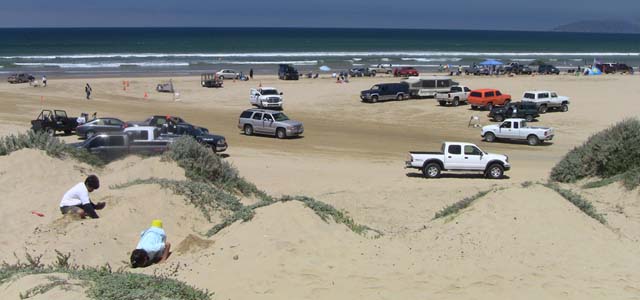Coastal Commission votes to ban off-roading in three years at Oceano Dunes
March 19, 2021

By JOSH FRIEDMAN
The California Coastal Commission voted unanimously on Thursday to phase out off-road vehicle usage at the Oceano Dunes over the next three years.
Additionally, the commission voted to ban nighttime vehicle riding at the Oceano Dunes, with exceptions for certain circumstances like arriving at or leaving the park after dark. Furthermore, the Coastal Commission voted to close the Pier Avenue entrance to the dunes by July 1, 2022.
In deciding to phase out off-road activity, commissioners argued vehicle usage at the dunes harms the environment and does not comply with the California Coastal Act.
The Coastal Commission has also cited environmental justice as a justification for closing the Oceano Dunes State Recreational Area. The commission determined the residents of Oceano and Nipomo, who are reportedly impacted by the dust, are largely underprivileged people of color.
Coastal Commission staff had recommended commissioners vote to phase out off-road vehicle access over the next five years and close State Parks’ Pier Avenue entrance by July 1, 2021. Commissioners amended the decision on phasing out off-road vehicle usage, shortening the timeline for banning off-roading at the park from five years to three years. The commission also decided to delay the closure of the Pier Avenue entrance by one year.
Friends of the Dunes, a nonprofit that represents approximately 28,000 supporters of off-road recreation, previously indicated it is ready to take legal action if either the Coastal Commission or California State Parks were to attempt to ban or reduce off-road vehicle usage at the dunes. The organization has successfully sued several state agencies, including the Coastal Commission, for failing to follow laws in their oversight of the dunes.
The Coastal Commission and State Parks have been battling for years over which agency will decide the future of off-roading at the Oceano Dunes. The parent agency for the two, the California Natural Resources Agency, has let the tussle continue for years even though the conflict has cost the state hundreds of thousands of dollars and drawn threats of lawsuits.
State Parks argued it has legislative authority over the park and that the Coastal Commission has no jurisdiction to ban off-road vehicle usage, based on the California Coastal Act and other legislation. State Parks is tasked with protecting the state’s natural and cultural resources, as well as creating opportunities for high-quality outdoor recreation.
The Coastal Commission asserts it has authority over the Oceano Dunes based on the Coastal Act. The Coastal Commission plans and regulates the use of land and water in the coastal zone, including “activities that change the intensity of use of land or public access to coastal waters.”
State Parks and the Coastal Commission began fighting a decade ago when SLO County’s Air Pollution Control District (APCD) first claimed it had tied off-road vehicle traffic at the Oceano Dunes State Recreational Area to higher levels of dust on the Nipomo Mesa, including a now-refuted claim that the dust contained dangerous levels of toxic crystalline silica.
Last week, Thomas Roth, the San Francisco-based attorney for Friends of the Dunes, sent a letter accusing the Coastal Commission of bias, overstepping its legislative authority and violating due process. While the Coastal Commission claims to have authority to reduce or eliminate off-roading at the park, Roth does not agree.
In 1975, the dunes were set aside for off-road vehicle recreation as part of the California Coastal Plan, which says off-road vehicle use “shall be permitted.”
“The Coastal Commission has jumped the shark,” Roth wrote in his letter. “It has no authority to direct State Parks to ban all OHV (off-highway vehicle) at a park expressly authorized for OHV use, especially where that use has lawfully existed for 40 years, and where the use predated even the creation of the Coastal Commission.”






The comments below represent the opinion of the writer and do not represent the views or policies of CalCoastNews.com. Please address the Policies, events and arguments, not the person. Constructive debate is good; mockery, taunting, and name calling is not. Comment Guidelines